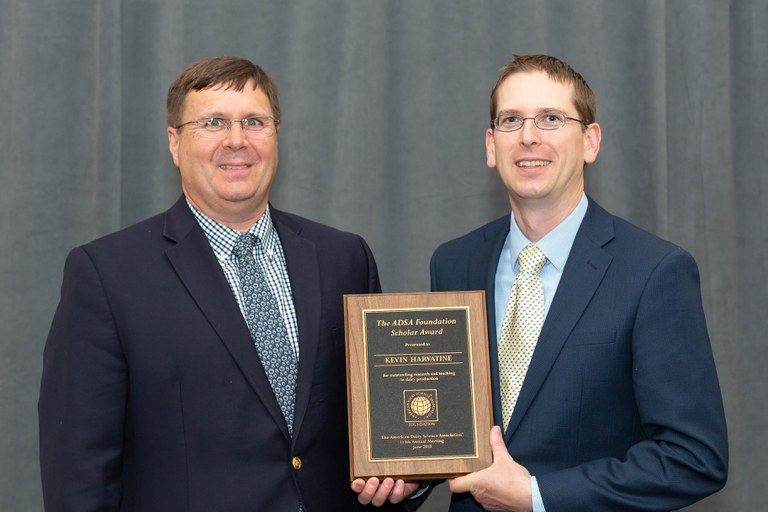Posted: July 23, 2018
Harvatine received the prestigious award for his research and educational leadership in identifying critical issues affecting the future of the dairy industry.

Kevin Harvatine, right, receives his award from Robert Roberts, head of the Department of Food Science and chair of the ADSA Foundation Board.
Kevin Harvatine, Associate Professor of Nutritional Physiology in Penn State's Department of Animal Science, received the prestigious 2018 ADSA Foundation Scholar Award in Dairy Production at the annual meeting of the American Dairy Science Association (ADSA) in Knoxville, TN in June.
The ADSA Foundation Scholar Award in Dairy Production was created to recognize a young scholar from the production division and their potential in research and educational leadership and to identify critical issues affecting the future of the dairy industry.
Harvatine received his B.S. from Penn State University in 2001, his M.S. from Michigan State University in 2003, and his Ph.D. from Cornell University in 2008. He is a native of Susquehanna County, PA.
Since 2009, Harvatine has established a unique research program that integrates traditional ruminant nutrition and modern molecular biology approaches to investigate the regulation of metabolism and develop dietary intervention strategies to improve dairy production. The development of feed strategies builds from his research on ruminal fatty acid biohydrogenation, regulation of synthesis of milk fat, and basic regulation of lipid synthesis.
Dr. Terry Etherton, Head of the Department of Animal Science, said, "It is a pleasure to congratulate Kevin, who is extremely deserving of this national recognition. His research is very valuable to the dairy industry around the world, and his leadership is having a profound impact at Penn State. We are very proud of his achievements and look forward to his continuing contributions."
Sonia L. Gelsinger, Robesonia, PA, was also recognized at the ADSA meeting with the Alltech, Inc. Graduate Student Paper Publication Award, for her paper on "Comparison of Immune Responses in Calves Fed Heat-Treated or Untreated Colostrum." A former graduate student of Jud Heinrichs, Ph.D., Professor of Dairy Science in Penn State's Department of Animal Science, she is his fourth Penn State student to receive the ADSA recognition since 2004. She received her B.S. from University of Wisconsin -Madison, and her Ph.D. from Penn State.
Harvatine has had numerous manuscripts published in the Journal of Dairy Science, and has presented invited talks in Australia, Brazil, China, Denmark, and regional and national conferences in the US and Canada. He presented a review of the regulation of milk fat synthesis at the 2018 ADSA meeting as part of the Foundation Scholar Award.
Providing strong leadership within the Department, he teaches principles of nutrition and has overseen master's and Ph.D. candidates as well as mentored visiting professors and graduate students. He has published 59 peer-reviewed articles in the past nine years (69 total in career) and has authored or coauthored 78 abstracts (96 total) and given over 70 invited presentations during his time on faculty. He has received research funding from USDA, the National Institute of Health (NIH), commodity organizations, and industry sponsors.
An active member of ADSA, Harvatine was previously president of the Joint Northeast Section of ASAS/ADSA, serves on the ADSA Discover Conference advisory board, and is co-chair of the 36th Discover Conference "Lipids in Dairy Nutrition: From feed to milk fat" to be held in May 2019. Harvatine is also on the Editorial Board of the Journal of Dairy Science.
Special requirements of the Foundation Scholar Award include 10 years or less since receiving a final academic degree, current active membership in ADSA, exemplary research or educational programs (instruction, extension, or industry), and potential for future leadership.

